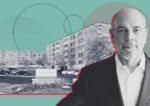The tug-of-war between renters seeking affordability and landlords chasing profitability is set to intensify as the supply of apartments begins to level off.
With the supply of new units predicted to slow over the next two years, the dynamics at play in Chicago’s rental market present a complex picture, with varying implications for city and suburban landlords, according to reporting from Crain’s and the Daily Herald.
In the heart of the city, rent growth for top-tier, or Class A, apartments has slowed. Net monthly rent averaged $3.75 per square foot in the second quarter, down 0.27 percent from the same period last year, according to Integra Realty Resources.
The drop comes after six months of tepid growth. Despite the slowdown, downtown building owners remain optimistic. Demand is strong, and recent projects are quickly leasing up. The stagnation is largely due to the influx of new supply, with 3,582 units expected to be delivered by the end the year, marking the largest annual addition since 2017.
“It takes a couple years to get a deal done, so the product that hit the market this year was for the most part conceived in 2021 and 2022,” Integra’s Senior Managing Director Ron DeVries said.
The absorption rate — a measure of how many units are being filled — has also been encouraging, with 1,792 units leased in the second quarter alone, the highest quarterly absorption since mid-2021.
New developments such as the Saint Grand in Streeterville and Arthur on Aberdeen in Fulton Market are seeing rapid leasing, with both buildings nearing full occupancy within months of opening.
Aaron Galvin, co-developer of the Saint Grand, attributes this success to the city’s appeal, noting that “about 50 percent of the renters in Class A downtown high-rise buildings are relocation tenants, meaning they are either coming from out of state or they’re coming from the greater Chicago suburban areas.”
However, the picture is not all rosy. Concessions, such as free rent for a month, are becoming more common as landlords compete to fill units. With only 500 new units expected downtown next year, supply is set to dwindle, potentially pushing rents up again.
“The number of cranes downtown has gone down dramatically,” DeVries said, predicting rent increases of up to 5 percent. This could make urban living more expensive, straining tenants but benefiting landlords poised to capitalize on renewals and higher rents.
The suburban market, meanwhile, faces its own challenges, particularly high demand and a tight supply. Holladay Properties’ Glenwood Station in Glen Ellyn, for instance, has seen unprecedented interest, with over 400 prospective tenants vying for just 86 units.
“I have never seen demand like we’re seeing,” Holladay Properties’ Drew Mitchell said.
Suburban supply is falling short, with just 2,500 Class A units expected to come online this year compared to 3,500 last year.
“There’s a number of deals under construction, but once these finish out, there’s just not much behind it,” DeVries said.
This shortage is making it difficult for developers to keep pace with demand. High construction costs and tighter lending conditions have stalled development, creating a supply-demand mismatch.
Yet, those who can secure a place are willing to pay, with suburban rents reaching $2.50 per square foot.
— Andrew Terrell
Read more



